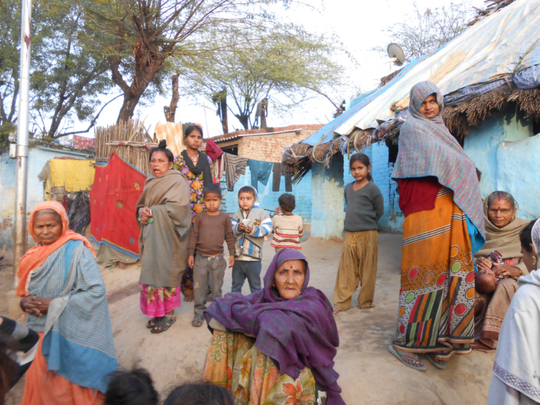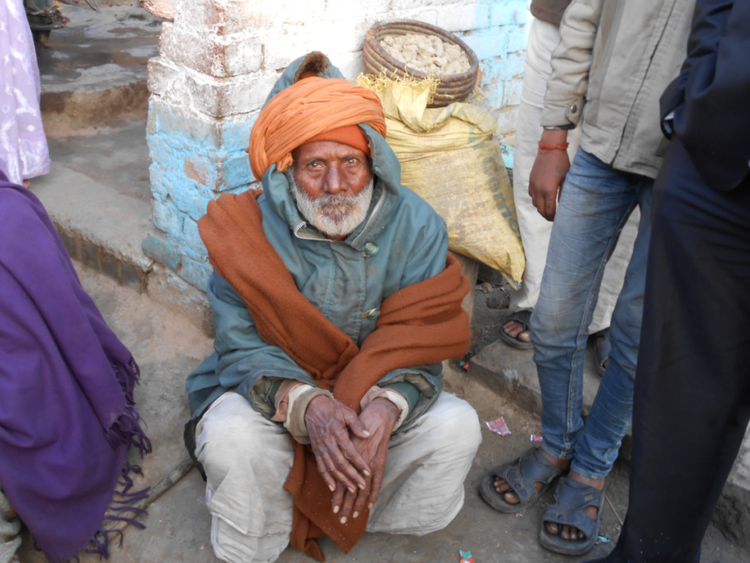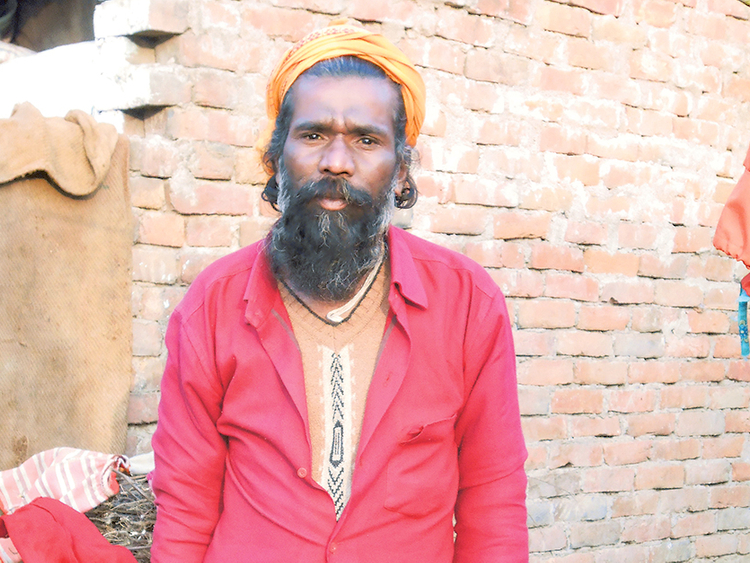A village of beggars in India
The residents of Kapadia Basti in Kanpur have been surviving on alms for centuries, and they are unwilling to switch occupations

Kapadia Basti on the edge of Kanpur, a major city in the northern Indian state of Uttar Pradesh, is one of the thousands of backward villages that dot the country.
At first sight, nothing strikes one as unusual in Kapadia Basti. Like any other village, it is a cluster of rundown houses with mud walls and thatched roofs, unpaved lanes with stagnant water on both sides and children milling around. The population of the village — about 4,000.
But once you spend some time here, you will notice that every man has luxuriant hair, moustache and beard, is dressed in loose clothes — saffron kurta and dhoti — and his forehead bears a “tilak” (A mark worn by a Hindu on the forehead to indicate caste, status, or sect, or as an ornament).
“We will lose our livelihood if we visit the barber and start wearing shirt and trousers,” says Ram Lal, 54, a native of the village. “We depend on alms for a living.”
Kapadia Basti is a village of beggars. Every family here depends on begging for survival. Every household prefers begging over jobs or to any other source of income.
The story of Kapadia Basti and its beggars begins about two centuries ago.
Ram Lal says, “Our forefathers were wanderers. When they found themselves at the edge of a city or a town, they would set up a small colony of tents. They spent a few days in the new place, going from home to home, seeking alms. That was their only source of income. That was their way of living. After spending a couple months in one place, they would dismantle their homes and head for a new city.”
About 200 years back, the band reached Kanpur. Kanpur had become a major British cantonment in north India but was yet to witness industrialisation.
“What I have heard from my father and grandfather is that Kapadia Basti and its adjoining areas at that time were owned by Raja Maan Singh. He found our forefathers harmless and religious. Raja Maan Singh requested our forefathers to settle in Kanpur. He was ready to give us land. So our forefathers settled here,” Ram Lal says.
The natives of Kapadia Basti, however, never gave up begging as their occupation.
In India, a holy Hindu man who has renounced the world is identified by his saffron clothes, long hair, beard and moustache, holding a begging bowl in one hand and staff in another. Hindus generally give alms to holy men at temples or those who visit their home.
“Begging is our occupation. If we don’t look like holy men, nobody will give us alms,” Ram Lal says.
Every morning after a quick bath at the only public hand pump, Ram Lal changes into a fresh pair of saffron kurta and dhoti. He combs his hair and beard for about 20 minutes. Looking into a small mirror, he carefully draws the tilak on his forehead.
Generally, sandalwood paste is used for making tilak. “But sandalwood is too expensive. So we use lime paste,” Ram Lal says.
Finally picking his staff and bowl, he leaves home.
Almost all natives, including the children of Kapadia Basti, follow the same routine. Only toddlers or the infirm stay at home.
The beggars spread out in different directions in Kanpur. They return to Kapadia Basti at nightfall.
Pratap, another native of the village, says, “I was born in Kapadia Basti and depended only on begging for a living. My father also born here. He was also a beggar.”
At 80, Pratap finds himself too old and weak to beg and hence stays at home. His four sons, their wives and 15 grandchildren are all beggars.
Local councillor Ashok Dubey says, “People of Kapadia have been begging for a living for centuries. They have never even thought of changing their occupation. They prefer begging to jobs or starting a small business. It may be because of lack of education.”
There is a government-run school close to the village. “But children go there only for food,” says Dubey. In India, children in all government-run schools are provided free lunch under the Mid-day Meal Scheme. “Once the children have food in the school, they are out on the streets begging.”
Close to the village is a temple that attracts hundreds of devotees every day and on Tuesdays and Saturdays, the number swells to thousands. “That temple is the school for the children. The children start begging from that temple. It is their stepping stone for becoming seasoned beggars,” says Dubey.
No adult in the village has ever been to school. They can’t read or write but Ram Lal keeps a ballpoint tucked in the pocket of his kurta.
“I have studied up to the second standard,” Ram Lal says.
Being illiterate, the people have never availed themselves of the benefits provided by the government for the poor and backward, says Dubey. Even if a native of Kapadia Basti gets a job, he or she will be reluctant to take it up, he adds.
“In a job, he or she will get a limited salary, say Rs10,000 [Dh551] or Rs20,000. But there is no limit to the amount they can make by begging. This is how they think,” says Dubey. “Here, the parents of a girl who has reached the marriageable age will prefer a beggar over a person who has a respectable job as her match.”
Hindus celebrate their festivals in a grand way and for several days. In Maharashtra, the festival of Ganesh Chaturthi is celebrated for 10 days. Durga Puja is celebrated in a grand way in West Bengal. “The men migrate to states such as Maharashtra and West Bengal during festivals and make a lot of money posing as holy men and begging,” says Dubey.
Ram Lal says they frequently visit New Delhi. “New Delhi has many big temples,” he says, naming the famous ones.
Dubey says the people of Kapadia Basti don’t know the concept of family planning. He cites the example of Kesar Bai, 62, who has 14 children.
“I don’t remember how many of my children died. Maybe four or five died when they were babies or toddlers,” says Kesar Bai.
Alcohol, says Dubey, is another big problem in the village. “The natives don’t return straight to their homes at the end of the day. They gather at liquor shops and spend most of their money. They get drunk and indulge in quarrels and fisticuffs. Police raids are pretty common in the village.”
Tej Bahadur Singh, head of the sociology department of PPN College in Kanpur, has a disparaging view of the community. “It is not good that these people depend on begging as livelihood. They are a part of the society and the country but they are not giving anything in return. They are only consuming from the society. They are just parasites.”
Kanpur became industrialised under the British. As India became free, the city saw more industrialisation. Coincidentally, the area around Kapadia Basti is the industrial hub of Kanpur, home to four government ordnance factories, a major fertiliser factory and hundreds of private factories manufacturing everything — from plastic cups and saucers and biscuits to scooters, motorcycles and tempos, as shared three-wheelers are known in Kanpur.
However, not one person from the village is employed in any of the factories. “The reason is simple. Begging gives the people of Kapadia Basti an easy and free life. There is no physical labour involved in begging. If you are employed, you will have to work hard, reach office on time, you will not be able to drink whenever you like, you will not be able to skip work, you will have to face the wrath of your seniors. They don’t want to work and become disciplined,” says Singh.
He says it is the duty of the government and social organisations to instil a feeling of pride among the beggars and inspire them to give up begging and take up a respectable occupation.
However, government officials seem unaware about the village of beggars.
Kaushal Raj Sharma, a top government official in Kanpur, says, “I am not aware about Kapadia Basti. I will look into the matter and see what can be done.”
Rohit Ghosh is a writer based in Kanpur, India.
At first sight, nothing strikes one as unusual in Kapadia Basti. Like any other village, it is a cluster of rundown houses with mud walls and thatched roofs, unpaved lanes with stagnant water on both sides and children milling around. The population of the village — about 4,000.
“We will lose our livelihood if we visit the barber and start wearing shirt and trousers,” says Ram Lal, 54, a native of the village. “We depend on alms for a living.”
Kapadia Basti is a village of beggars. Every family here depends on begging for survival. Every household prefers begging over jobs or to any other source of income.
The story of Kapadia Basti and its beggars begins about two centuries ago.
Ram Lal says, “Our forefathers were wanderers. When they found themselves at the edge of a city or a town, they would set up a small colony of tents. They spent a few days in the new place, going from home to home, seeking alms. That was their only source of income. That was their way of living. After spending a couple months in one place, they would dismantle their homes and head for a new city.”
About 200 years back, the band reached Kanpur. Kanpur had become a major British cantonment in north India but was yet to witness industrialisation.
“What I have heard from my father and grandfather is that Kapadia Basti and its adjoining areas at that time were owned by Raja Maan Singh. He found our forefathers harmless and religious. Raja Maan Singh requested our forefathers to settle in Kanpur. He was ready to give us land. So our forefathers settled here,” Ram Lal says.
The natives of Kapadia Basti, however, never gave up begging as their occupation.
In India, a holy Hindu man who has renounced the world is identified by his saffron clothes, long hair, beard and moustache, holding a begging bowl in one hand and staff in another. Hindus generally give alms to holy men at temples or those who visit their home.
“Begging is our occupation. If we don’t look like holy men, nobody will give us alms,” Ram Lal says.
Every morning after a quick bath at the only public hand pump, Ram Lal changes into a fresh pair of saffron kurta and dhoti. He combs his hair and beard for about 20 minutes. Looking into a small mirror, he carefully draws the tilak on his forehead.
Generally, sandalwood paste is used for making tilak. “But sandalwood is too expensive. So we use lime paste,” Ram Lal says.
Finally picking his staff and bowl, he leaves home.
Almost all natives, including the children of Kapadia Basti, follow the same routine. Only toddlers or the infirm stay at home.
The beggars spread out in different directions in Kanpur. They return to Kapadia Basti at nightfall.
Pratap, another native of the village, says, “I was born in Kapadia Basti and depended only on begging for a living. My father also born here. He was also a beggar.”
At 80, Pratap finds himself too old and weak to beg and hence stays at home. His four sons, their wives and 15 grandchildren are all beggars.
Local councillor Ashok Dubey says, “People of Kapadia have been begging for a living for centuries. They have never even thought of changing their occupation. They prefer begging to jobs or starting a small business. It may be because of lack of education.”
There is a government-run school close to the village. “But children go there only for food,” says Dubey. In India, children in all government-run schools are provided free lunch under the Mid-day Meal Scheme. “Once the children have food in the school, they are out on the streets begging.”
Close to the village is a temple that attracts hundreds of devotees every day and on Tuesdays and Saturdays, the number swells to thousands. “That temple is the school for the children. The children start begging from that temple. It is their stepping stone for becoming seasoned beggars,” says Dubey.
No adult in the village has ever been to school. They can’t read or write but Ram Lal keeps a ballpoint tucked in the pocket of his kurta.
“I have studied up to the second standard,” Ram Lal says.
Being illiterate, the people have never availed themselves of the benefits provided by the government for the poor and backward, says Dubey. Even if a native of Kapadia Basti gets a job, he or she will be reluctant to take it up, he adds.
“In a job, he or she will get a limited salary, say Rs10,000 [Dh551] or Rs20,000. But there is no limit to the amount they can make by begging. This is how they think,” says Dubey. “Here, the parents of a girl who has reached the marriageable age will prefer a beggar over a person who has a respectable job as her match.”
Hindus celebrate their festivals in a grand way and for several days. In Maharashtra, the festival of Ganesh Chaturthi is celebrated for 10 days. Durga Puja is celebrated in a grand way in West Bengal. “The men migrate to states such as Maharashtra and West Bengal during festivals and make a lot of money posing as holy men and begging,” says Dubey.
Ram Lal says they frequently visit New Delhi. “New Delhi has many big temples,” he says, naming the famous ones.
Dubey says the people of Kapadia Basti don’t know the concept of family planning. He cites the example of Kesar Bai, 62, who has 14 children.
“I don’t remember how many of my children died. Maybe four or five died when they were babies or toddlers,” says Kesar Bai.
Alcohol, says Dubey, is another big problem in the village. “The natives don’t return straight to their homes at the end of the day. They gather at liquor shops and spend most of their money. They get drunk and indulge in quarrels and fisticuffs. Police raids are pretty common in the village.”
Tej Bahadur Singh, head of the sociology department of PPN College in Kanpur, has a disparaging view of the community. “It is not good that these people depend on begging as livelihood. They are a part of the society and the country but they are not giving anything in return. They are only consuming from the society. They are just parasites.”
Kanpur became industrialised under the British. As India became free, the city saw more industrialisation. Coincidentally, the area around Kapadia Basti is the industrial hub of Kanpur, home to four government ordnance factories, a major fertiliser factory and hundreds of private factories manufacturing everything — from plastic cups and saucers and biscuits to scooters, motorcycles and tempos, as shared three-wheelers are known in Kanpur.
However, not one person from the village is employed in any of the factories. “The reason is simple. Begging gives the people of Kapadia Basti an easy and free life. There is no physical labour involved in begging. If you are employed, you will have to work hard, reach office on time, you will not be able to drink whenever you like, you will not be able to skip work, you will have to face the wrath of your seniors. They don’t want to work and become disciplined,” says Singh.
He says it is the duty of the government and social organisations to instil a feeling of pride among the beggars and inspire them to give up begging and take up a respectable occupation.
However, government officials seem unaware about the village of beggars.
Kaushal Raj Sharma, a top government official in Kanpur, says, “I am not aware about Kapadia Basti. I will look into the matter and see what can be done.”
Rohit Ghosh is a writer based in Kanpur, India.








No comments:
Post a Comment